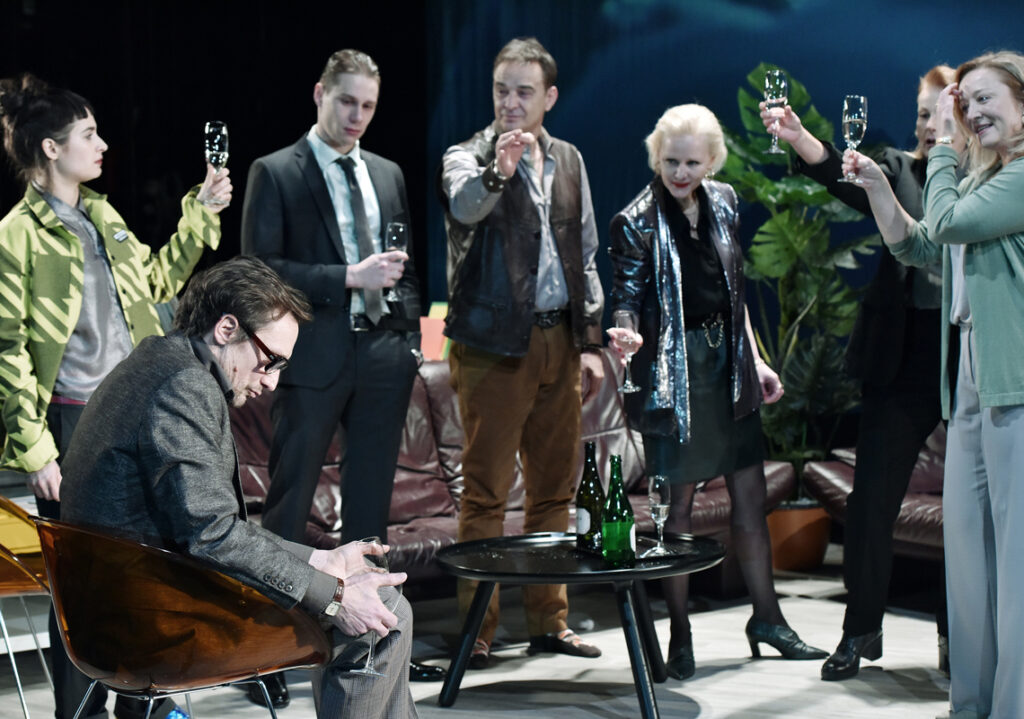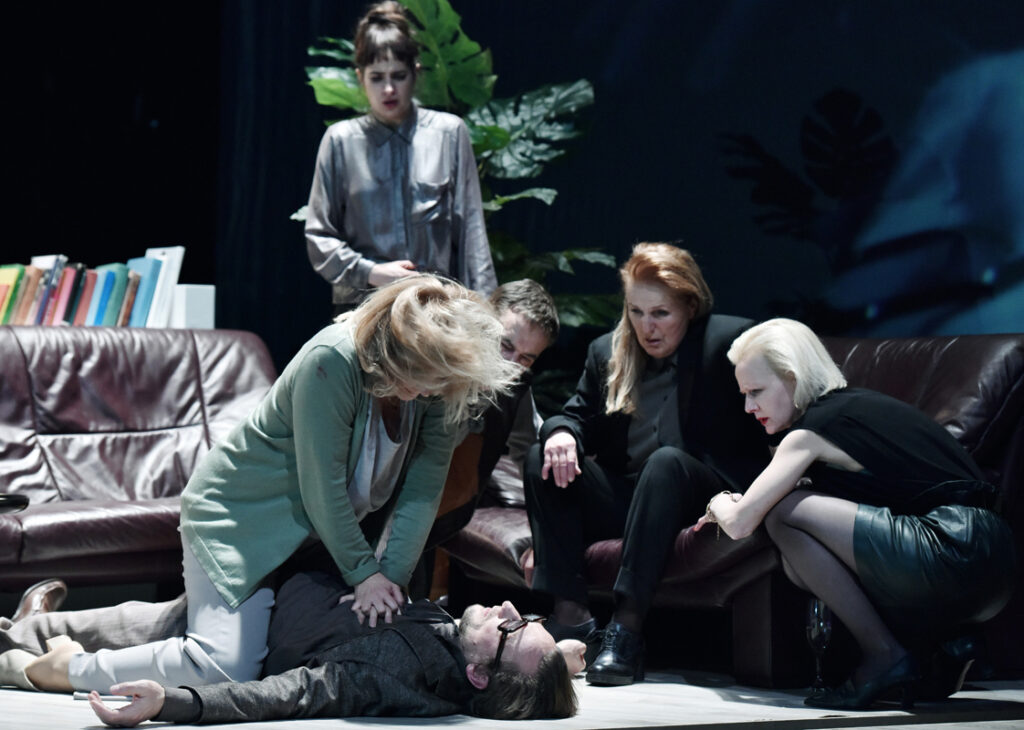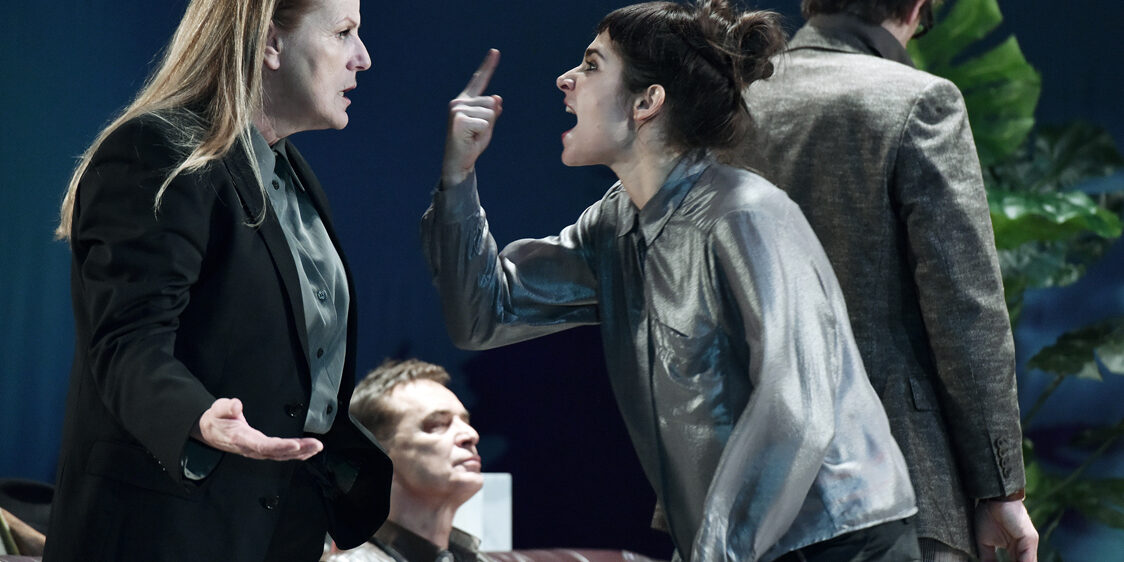SNG Drama Ljubljana, premiere 26th January 2022
During a times of postponements of premieres and cancellation of performances, SNG Drama Ljubljana managed to successfully open its latest premiere on time: The Party, directed by Ivica Buljan.
A stage adaptation of Sally Potter’s 2017 film of the same name, the play is a black comedy that takes place in Janet and Bill’s London home. Janet, Shadow Minister for Health, a member of the opposition party – a position she attained after many years of hard work and perseverance – has organised a celebration to which she has invited her closest friends: April, her best friend and former activist, his partner Gottfried, a life coach; Martha, a university professor and Jinny, a young chef; Janet’s close co-worker Marianne, who is late due to work and her husband, the economist Tom. Though they are all representatives of the left-leaning British upper-middle class, among them, it is Tom who stands out as the most obvious representation of “evil” capitalists in juxtaposition with the cosmopolitan intellectuals.
Marko Požlep’s scenography consists of a cross-section of the apartment, which allows a view of all the rooms at once, the kitchen, where Janet mostly prepares the meals, the living room, the main meeting place for everyone, and the bathroom where the characters take refuge. It is also indicated (though not directly displayed) that there is a garden behind the house. The design allows simultaneous events to take place on stage and the director takes advantage of this opportunity. The action flows smoothly from one area to another. While characters are talking in one area, events take place in the other spaces, creating a realistic sense of the passing of time.

The Party. Photo: Peter Uhan/SNG Drama Ljubljana.
This approach requires the actors to be present throughout the whole performance. And the actors are central to the success of this performance. The approach of the cast lies somewhere between realistic stage and film acting, as the evening transforms from a celebration to an exploration of the personal issues of these people and their well-situated social positions.
At the start, we see Janet secretly responding to someone with kisses over the phone. This establishes that this is a world where everyone lives double lives, the public and the personal. Nataša Barbara Gračner combines Janet’s calm surface with her more turbulent inner feelings, which become increasingly external and physical. Polona Juh embodies April as someone who does not spare a single biting remark, in contrast to the (apparent) correctness of the others. She has an “all over the place” energy.. However, the party goes downhill when Bill (played with consistent melancholy by Marko Mandić, with rare physical outbursts) makes an announcement that he has an incurable disease and that he wants to spend the rest of his life with Marianne. The marriage of Martha and Jinny is also put to the test. Zvezdana Mlakar’s Martha tries to maintain her superior position with nuanced doubt while Saša Pavlin Stošić, as Jinny, expresses every feeling of the emotional rollercoaster she is experiencing.

The Party. Photo: Peter Uhan/SNG Drama Ljubljana.
Gottfried (Igor Samobor) provides welcome deviation from the growing tensions and anger, taking the opportunity to share his thoughts on the futility of Western medicine and offer an alternative in the holistic approach of self-medication, which he seems increasingly receptive to in extreme circumstances. Samobor’s witty and consistently broad performance manages to mock both New Age spirituality and those who swear by science, pointing out the limitations of their blind followers.
The dramatic space is democratically arranged, allowing each character room to develop and justify their own position. Tom, Marianne’s husband, played by Timon Šturbej in a somewhat hasty way, has the least depth and is more of a bland caricature than the others.
The whole performance follows a kind of cinematic logic, both in its staging and in the passage of time. It is framed by film-like intro and outro sequences, which are screened on the projection screen behind the set. The characters, their names and their roles are written there too, helping to clarify in advance the relationship between them and the viewer.
But the play is itself effective in drawing the strokes of the individual characters, so these projections are more of an addition to the aesthetic than something that serves a narrative function. The same could be said for the simultaneous recording of events on stage with multiple cameras, which is directly projected on to the screen. This is an interesting idea, but it remains under-developed. It does not offer the added value of cinema – like close-ups of faces – and is therefore easy to forget; sometimes it is even distracting.
The performance does not try to break down stereotypes and prejudices, rather it uses them as a springboard for a witty and pleasing account of the morals and freedoms of the financially well-off. The production succeeds thanks to the considerable ability of the actors, rather than the directorial concept, which feels at times superfluous.
Credits
Iva Š. Slosar is a student of dramaturgy and performing arts. She writes theatre criticism for web portals and participates in the cultural department of Radio Študent (Slovenia). She is also engaged in drama writing and theatrical creation as a practical dramaturg.








